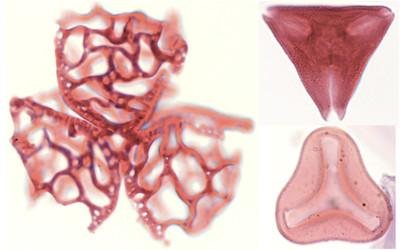£500k+ funding secured for OU 'Mind the Gap' project on angiosperm evolution

The Open University (OU) has secured over £500,000 in funding to support pioneering research to solve one of the longest-standing mysteries in plant evolution - the early origins and diversification of angiosperms (flowering plants).
Unravelling the "abominable mystery"
For a long time, scientists have struggled to reconcile differences in angiosperm evolution timelines derived from fossil records and molecular genetic data. Charles Darwin himself famously described the origin of angiosperms as an "abominable mystery."
The international project, "Mind the Gap", led by The Open University in collaboration with the University of Illinois Urbana-Champaign and the Royal Botanic Gardens, Kew, is set to tackle this challenge by focusing on pollen grains from a key plant group: the Chloranthaceae.
By integrating advanced microscopy, deep learning, and molecular genetics, the project aims to tackle the discrepancies between fossil and molecular data on early angiosperm evolution, providing new insights into how these plants came to dominate Earth's ecosystems.
A unique multi-disciplinary collaboration
The project brings together leading experts in multiple scientific disciplines. At The Open University, Dr Luke Mander will spearhead work on fossil pollen. Dr Surangi Punyasena from the University of Illinois Urbana-Champaign will lead the deep learning aspect, utilizing AI to analyse pollen morphology. Meanwhile, Professor Alexandre Antonelli at the Royal Botanic Gardens, Kew, will oversee the molecular genetics component. This multidisciplinary approach will generate a new window into angiosperm evolution.
Transforming knowledge with real-world impact
Beyond answering fundamental evolutionary questions, the project has significant real-world implications. By pioneering novel methods for characterizing biodiversity across timescales, the research will directly support international conservation efforts under the Kunming-Montreal Global Biodiversity Framework. Insights gained from the study will also provide long-term evolutionary perspectives essential for understanding and preserving modern ecosystems.
The project is part of the School of Environment, Earth, and Ecosystem Sciences' broader efforts to advance knowledge on planetary sustainability and biodiversity. Through interdisciplinary collaboration, cutting-edge technology, and a commitment to scientific excellence, this research embodies the OU’s mission to generate impactful knowledge for the benefit of wider society.
With this substantial funding that will support two postdoctoral researchers, The Open University is poised to make a major contribution to evolutionary biology, cementing its reputation as a leader in innovative and world-changing research.
Quarterly Review of Research
Read our Quarterly Review of Research to learn about our latest quality academic output.

Contact our news team
For all out of hours enquiries, please telephone +44 (0)7901 515891
Contact details